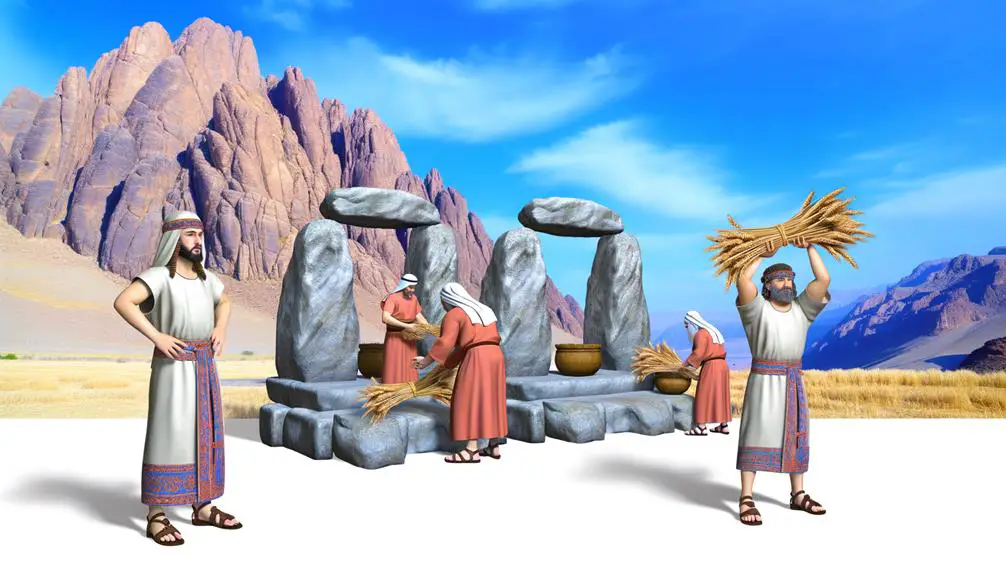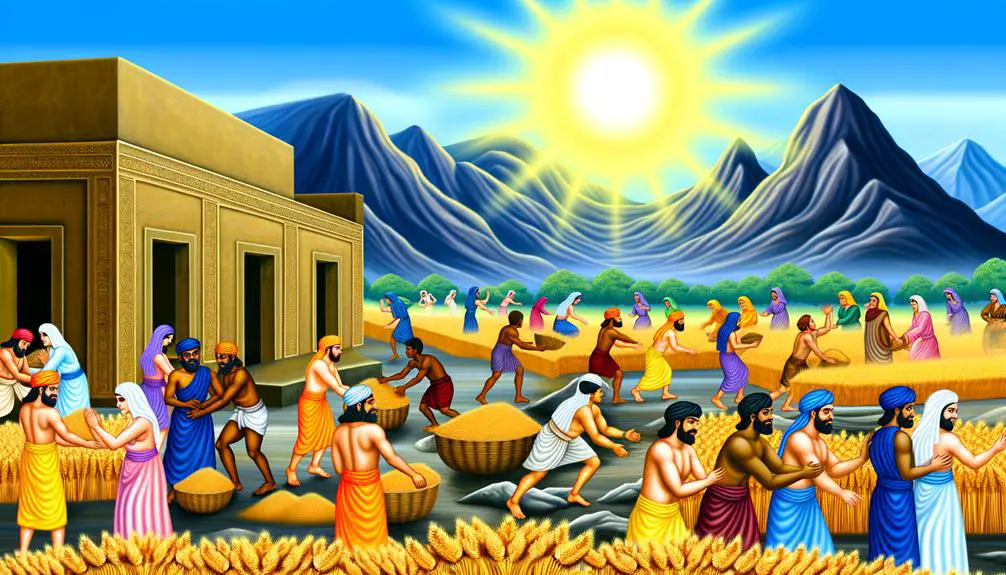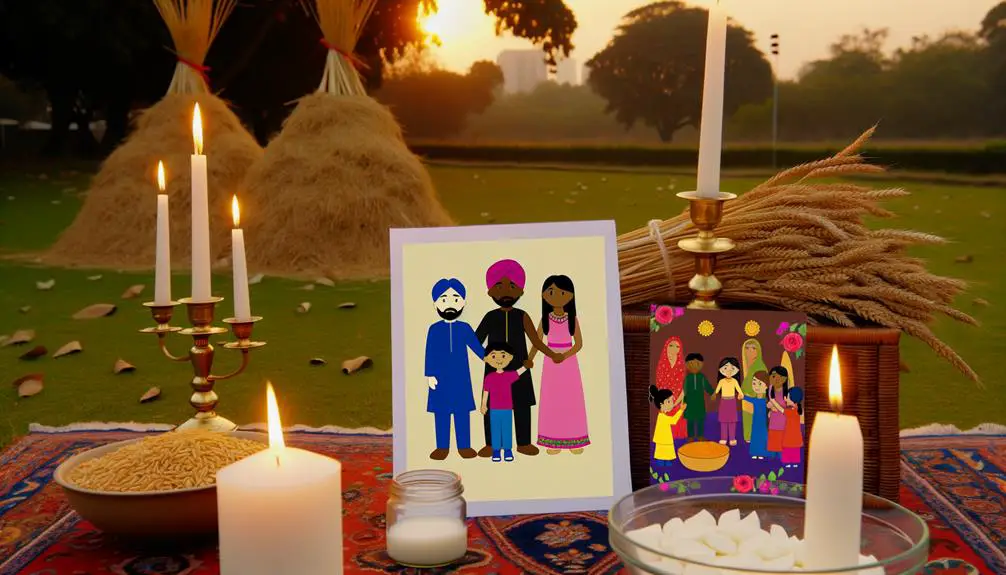Explore how the Festival of Weeks blends ancient harvest celebrations with the profound spiritual event of receiving the Torah at Mount Sinai.

Festival of Weeks in the Bible
The Festival of Weeks, or Shavuot, holds a profound dual significance in biblical context—both agricultural and spiritual. You'll find it originated as a harvest festival in ancient Israel, marking the shift from barley to wheat harvests and integrating rituals to secure a bountiful crop. However, its spiritual dimensions elevate the festival beyond mere agrarian concerns, commemorating the monumental event of the Torah's revelation at Mount Sinai. The rituals, including offerings of new grain and cessation of work, underscore themes of gratitude, divine covenant, and community unity. As you explore further, you'll uncover deeper insights into how this festival interweaves historical customs with ongoing cultural and spiritual observance.
Key Takeaways
- The Festival of Weeks, also known as Shavuot, marks the wheat harvest in Israel and the giving of the Torah at Mount Sinai.
- It occurs seven weeks after Passover, symbolizing the link between the Exodus and the divine revelation.
- Biblical instructions include offering two loaves of leavened bread and ceasing work on this holy convocation day.
- Traditionally, it involves the presentation of first fruits at the Temple, showing gratitude and divine connection.
- Shavuot is highlighted in the Bible as a time for renewing the covenant with God and celebrating divine laws and guidance.
Historical Origins

The Festival of Weeks, or Shavuot, originated in ancient Israel as a harvest festival, marking the end of the spring barley harvest and the beginning of the wheat harvest. This period, deeply intertwined with ancient celebrations and seasonal timing, reflects a significant agricultural shift. Ancient Israelites, you'll find, aligned their communal and religious practices with the natural agricultural cycle, ensuring that their celebrations were both timely and resonant with their daily lives.
The festival's timing, dictated by the lunar calendar, typically placed it exactly seven weeks after Passover. This interval, known as the Counting of the Omer, spans a critical period in the agricultural calendar, bridging the barley and wheat harvests. This counting wasn't just a methodical ticking of days; it was a period of keen anticipation, as the community's sustenance and economic stability hung in the balance.
During this time, ancient ceremonies and rituals were performed to invoke divine favor for a bountiful wheat harvest. The integration of these practices into the fabric of their society underscores how pivotal agriculture was to their cultural and spiritual identity. Their reliance on the seasonal cycles to dictate the timing of Shavuot highlights a profound connection between their environment, survival, and religious expression.
Agricultural Significance
Understanding the Festival of Weeks' agricultural significance requires examining how its practices directly influenced farming activities and crop yields in ancient Israel. During this period, you were actively engaged in the early wheat harvest, which was not only a time of great labor but also a critical period for evaluating the sustainability of agricultural practices such as crop rotation and soil fertility management.
The Festival of Weeks, falling at the conclusion of the barley harvest and the beginning of the wheat harvest, marked a pivotal time in your agricultural calendar. It's likely that you followed a crop rotation system, alternating between barley, wheat, and fallow segments. This practice would have helped maintain soil fertility by reducing nutrient depletion, important for sustaining your long-term crop yields.
Moreover, this festival period encouraged the enrichment of the soil through the incorporation of legumes and other nitrogen-fixing plants in the rotations, enhancing soil structure and fertility. You would have planned your planting and harvesting schedules around this festival, using it as a guidepost for the best times to sow and reap, ensuring that the soil was neither overused nor undernourished.
Therefore, the Festival of Weeks was not just a religious observance but a sophisticated component of your agricultural strategy, deeply intertwined with the health of your land and the prosperity of your community.
Spiritual Dimensions

Beyond its agricultural importance, you'll find that the Festival of Weeks also held profound spiritual dimensions, deeply resonating with your ancient religious practices and beliefs. This festival, celebrated seven weeks after Passover, was not only about thanking God for the harvest but also about commemorating divine revelations, particularly the giving of the Torah at Mount Sinai. This event is pivotal, as it marks the moment when you, as part of the Israelite community, entered into a covenant with God, receiving the law that would define your moral and spiritual contours.
The prophetic meanings embedded in this festival are manifold. Scholars often interpret the Festival of Weeks as a symbol of the ideal state of divine-human relationships, where the gift of the Torah is seen as the culmination of God's salvific plan initiated during Passover. This period of counting the Omer, leading up to the festival, reflects a time of spiritual purification and preparation, making you ready to receive and fully comprehend the divine laws.
Thus, the Festival of Weeks serves as a profound reminder of your historical and continual commitment to live by the divine guidance, celebrating not only physical sustenance but also spiritual enrichment and revelation.
Rituals and Practices
Reflecting on the spiritual significance you've explored, let's now examine the specific rituals and practices that embody the Festival of Weeks. This festival, also known as Shavuot, is deeply rooted in the agricultural calendar of ancient Israel, marking the end of the barley harvest and the beginning of the wheat harvest. The ceremonial details prescribed in the Torah involve the offering of two loaves of bread, made from the first fruits of the wheat harvest. These are not just any loaves; they must be leavened, which starkly contrasts with the unleavened bread mandated during Passover.
The offering specifics are intricate. You are to present these alongside seven lambs, one young bull, and two rams as burnt offerings, signifying completeness and dedication to God. Additionally, a sin offering of a goat and two lambs as peace offerings are required, symbolizing reconciliation and communion with God. These offerings underscore a communal celebration of bounty and divine blessing.
Moreover, this festival is marked by a cessation of all servile work, a holy convocation where you, like the ancient Israelites, are invited to pause and reflect on the spiritual and material abundance provided by God. This sacred time fosters communal unity and spiritual renewal, pivotal in reinforcing the covenantal relationship between you and the divine.
Contemporary Observances

Today's observance of the Festival of Weeks integrates ancient rituals with modern practices, reflecting its enduring significance in Jewish life. This blend isn't just a confirmation of the festival's adaptability but also highlights its role in fostering a broader cultural and religious appreciation.
Global adaptations of the Festival of Weeks can be seen in how communities incorporate local customs and languages into the celebration. This localization guarantees the festival remains relevant and accessible, particularly in diverse societies. Interfaith participation, too, has grown, with non-Jewish groups often invited to partake in the festivities, promoting mutual respect and understanding across different religious communities.
Key aspects of contemporary observance include:
- Educational Programs: Many synagogues and community centers run workshops and seminars about the festival's historical and spiritual significance, aiming to deepen understanding and engage younger generations.
- Culinary Innovation: Traditional foods are reimagined with new ingredients and styles, reflecting the global diaspora of Jewish communities.
- Digital Engagement: Online platforms are increasingly used to broadcast events, discussions, and ceremonies, making sure that even those unable to attend in person can participate.
These elements underscore a dynamic tradition that respects historical roots while evolving in a modern context.
Impact on Jewish Culture
As you explore the Festival of Weeks, you'll notice how it has been pivotal in reinforcing religious practices within the Jewish community. This celebration not only strengthens individuals' faith but also solidifies community identity, creating a collective memory and shared experiences. Additionally, the transmission of cultural traditions through generations is facilitated, ensuring the longevity and vibrancy of Jewish cultural heritage.
Religious Practices Reinforced
The Festival of Weeks profoundly shapes Jewish cultural identity, reinforcing religious practices that have been central to community cohesion and spiritual life. This festival is not just a time of celebration but also a period for deep reflection and reaffirmation of core values that are rooted in divine commandments and ethical teachings.
Here are the key aspects:
- Recitation and Study: You engage in the recitation of specific prayers and participate in intensive study sessions focusing on the Torah, particularly the Book of Ruth, underscoring the importance of divine law and ethical behavior.
- Offering of First Fruits: This ritual symbolizes gratitude and dependence on divine providence, reinforcing a sense of humility and community responsibility.
- Reenactment of Sinai: Commemorating the revelation at Mount Sinai, you relive the acceptance of the Torah, which is foundational to Jewish faith and practice, reinforcing the covenant between God and Israel.
Community Identity Solidified
Festival of Weeks solidifies community identity among Jews by celebrating shared traditions and values that have been passed down through generations. This celebration acts as an essential conduit for identity formation, weaving individual stories into a collective narrative. Through a series of social interactions—discussions, communal prayers, and shared meals—participants reinforce their sense of belonging and affirm their role within the larger Jewish community. These interactions are not only ceremonial but serve as critical moments where communal values are articulated and transmitted. Therefore, the Festival of Weeks isn't just a temporal event but a dynamic, participatory process through which Jewish identity is both expressed and strengthened, ensuring the continuity and resilience of communal bonds across time.
Cultural Traditions Passed
Building on this foundation of communal identity, the Festival of Weeks also serves as a pivotal moment for transmitting essential cultural traditions within Jewish culture. You'll find that each aspect of the festival deepens your understanding of:
- Family Heirlooms: These aren't just physical items but include recipes, prayers, and customs that have been handed down through generations.
- Generational Storytelling: The retelling of the Sinai revelation, which is central to the festival, fosters a profound connection with your ancestry and the collective memory of your people.
- Ritual Practices: Specific readings and the ceremonial offering of the First Fruits link you to historical practices that have shaped Jewish identity across millennia.
These elements maintain the continuity of a rich, enduring cultural heritage.
Frequently Asked Questions
How Does Weather Affect the Festival of Weeks?
Weather impacts your festival by influencing agricultural significance and seasonal preparations. Ideal conditions enhance crop growth, central to the event's timing and celebration, while poor weather can disrupt these critical festival elements.
What Are Common Misconceptions About the Festival of Weeks?
You might think the Festival of Weeks primarily celebrates historical origins, but it's deeply rooted in agricultural significance, acknowledging crop harvests rather than merely commemorating past events.
Can Non-Jews Participate in Festival of Weeks Celebrations?
Yes, non-Jews can participate in Festival of Weeks celebrations, promoting cultural inclusivity and enriching interfaith dialogue. It's a chance for you to experience and appreciate diverse religious traditions and cultural expressions.
How Do Children Typically Engage With the Festival of Weeks?
Ever wondered how children engage in cultural festivals? During the Festival of Weeks, child participation often includes educational activities that help them understand and appreciate the event's significance through interactive, age-appropriate learning experiences.
Are There Specific Colors or Symbols Associated With the Festival of Weeks?
You'll find that specific colors and symbols, like cultural attire and harvest decorations, are integral, reflecting the festival's historical and agricultural significance through vivid, symbolically rich elements that enhance its communal and celebratory aspects.



Sign up